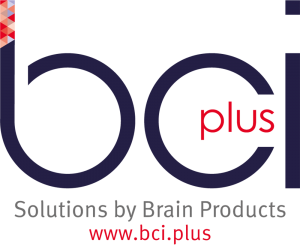BCI+ solutions by Brain Products
by Dr. Patrick Britz
Marketing Director (Brain Products)
Brain Products created a new website to show all our solutions for the BCI+ field in one place. On www.bci.plus we provide a framework of hard- and software to enable high impact research using brain-computer interface technology. This framework can be used in classical brain-computer interface research but also for Neuroadaptive Technology, Neuroergonomics, Physiological Computing, Symbiotic Interaction and more. These fields are not mutually exclusive, but rather intersect methodologically and are referred to as “BCI+”.
 Brain Products offers a wide range of EEG amplifiers and electrode systems to provide solutions for nearly every research scenario. We cover the full spectrum of your measurement needs, from gold-standard lab recordings with active gel-based electrodes to a fully mobile and wireless active-dry electrode recording. Even better than that: most of our hardware lineup is inter-compatible. That means that you can pilot your experiment with a stationary high density lab amplifier like the actiCHamp before you bring it into the field. It is as simple as plugging the electrode connector from your actiCHamp into our wireless amplifier, the LiveAmp. You can effortlessly switch between dry, gel-based, or salt-water based electrodes with passive or active electrode technology. Our range of hardware shown on www.bci.plus completely covers BCI+ related needs. If it does not cover your research needs yet, please let us know! We want to know what is next in BCI+, to also provide you the best solutions in the future.
Brain Products offers a wide range of EEG amplifiers and electrode systems to provide solutions for nearly every research scenario. We cover the full spectrum of your measurement needs, from gold-standard lab recordings with active gel-based electrodes to a fully mobile and wireless active-dry electrode recording. Even better than that: most of our hardware lineup is inter-compatible. That means that you can pilot your experiment with a stationary high density lab amplifier like the actiCHamp before you bring it into the field. It is as simple as plugging the electrode connector from your actiCHamp into our wireless amplifier, the LiveAmp. You can effortlessly switch between dry, gel-based, or salt-water based electrodes with passive or active electrode technology. Our range of hardware shown on www.bci.plus completely covers BCI+ related needs. If it does not cover your research needs yet, please let us know! We want to know what is next in BCI+, to also provide you the best solutions in the future.
Now that you can get a full hardware package to record good EEG data, you will want to analyse it with the software you know best. This is why we stay up to date and make sure our hardware is well integrated with all the widely used toolboxes dedicated to BCI+ research, including OpenViBE and BCILAB. Each of these toolboxes offer their own set of real-time data analysis tools that allow classifiers to identify specific states of brain activity. Of course, we also provide SDK level access to our amplifiers for free, so you can integrate raw data access into your own applications. On www.bci.plus we show you the software integrations that help you in your research.
You expect your BCI research tools to give correct timing and very fast data access. This can become a complex challenge if your setup also includes other input modalities, like mouse, keyboard, or psychophysiological measures such as gaze input, EMG, EOG, ECG. Typically, each input is sampled at a different rate, leading to a mixture of data streams with different sampling intervals. An increasingly popular and powerful solution to this challenge is, LabStreamingLayer (LSL). It allows you to synchronize various data streams and communication in real-time. We are working with LSL experts like David Medine to stay on the cutting edge of hardware integration. With this, the Brain Products BCI+ solutions enable experiments and applications with multimodal input streams and exact timing. If you have not done so already, you should take a look at LSL.
On our dedicated website, we created a blog to show the use of our hard- and software solutions for BCI+ research. For example, you can find out about our ultra-fast closed loop solution using an actiCHamp or discover powerful multimodal integrations with LSL. Let us know if you would like us to cover another topic. If you want to share how you used our BCI+ solutions in your research, we invite you to become a guest blogger as well! We look forward to hearing from you.
We will keep you up to date. On www.bci.plus we will announce conferences and workshops in BCI+ fields. For example, we just had a successful and very interesting workshop at CHI 2018 in Montreal. We will offer a cutting edge workshop as a satellite event before the BCI conference 2018 in Asilomar. There we will demonstrate our framework of BCI+ solutions. But we will also have a discussion with experts from the field about what is next in BCI. We are looking forward to seeing you at conferences and reading your guest blog posts about your BCI+ research.

